13 start with C start with C
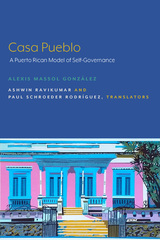

Porter first began work on this project in 1972, asking 250 farmers in the region about life history, environmental and agricultural changes, types of crops grown and methods of planting, environmental assessments, agricultural practices, food and water supplies, training and education, and attitudes toward nature. Twenty years later, he returned and reinterviewed as many farmers as could be found from the first survey. The result contextualizes the environmental history of the region while informing current and future agricultural development.
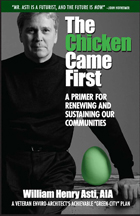
“Sustainability is not a buzz-word anymore; it’s a matter of survival. Meaningful achievement in sustainability will require significant paradigm shifts in attitudes about how we live, how we consume resources, how we govern ourselves and how we transport people and goods. Asti’s excellent exploration of the issues is a must-read.”
-- Subrata Basu, AIA, AICP Miami-Dade County Department of Planning and Zoning
“Industries, health care, education and others are trying to tread more lightly on our environment. To achieve sustainability goals our times demand, we must work together to maximize the benefit to our communities. Asti has always seen the larger picture and encouraged orchestration of diverse initiatives. The Chicken Came First is full of knowledge, sensitivity, and insights certain to advance the achievement of sustainable communities.”
--Richard Renfro, AIA
Renfro Design Group, AIA, New York City
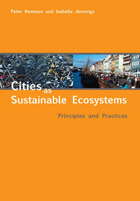
Cities as Sustainable Ecosystems shows how cities and their residents can begin to reintegrate into their bioregional environment, and how cities themselves can be planned with nature’s organizing principles in mind. Taking cues from living systems for sustainability strategies, Newman and Jennings reassess urban design by exploring flows of energy, materials, and information, along with the interactions between human and non-human parts of the system.
Drawing on examples from all corners of the world, the authors explore natural patterns and processes that cities can emulate in order to move toward sustainability. Some cities have adopted simple strategies such as harvesting rainwater, greening roofs, and producing renewable energy. Others have created biodiversity parks for endangered species, community gardens that support a connection to their foodshed, and pedestrian-friendly spaces that encourage walking and cycling.
A powerful model for urban redevelopment, Cities as Sustainable Ecosystems describes aspects of urban ecosystems from the visioning process to achieving economic security to fostering a sense of place.

Contributors: Janet Abu-Lughod, Northwestern U and New School for Social Research; Robert Beauregard, Columbia U; Larry Bennett, DePaul U; Andrew A. Beveridge, Queens College and CUNY; Amy Bridges, U of California, San Diego; Terry Nichols Clark, U of Chicago; Nicholas Dahmann, U of Southern California; Michael Dear, U of California, Berkeley; Steven P. Erie, U of California, San Diego; Frank Gaffikin, Queen's U of Belfast; David Halle, U of California, Los Angeles; Tom Kelly, U of Illinois at Chicago; Ratoola Kunda, U of Illinois at Chicago; Scott A. MacKenzie, U of California, Davis; John Mollenkopf, CUNY; David C. Perry, U of Illinois at Chicago; Francisco Sabatini, Ponticia Universidad Catolica de Chile; Rodrigo Salcedo, Pontificia Universidad Catolica de Santiago; Dick Simpson, U of Illinois at Chicago; Daphne Spain, U of Virginia; Costas Spirou, National-Louis U in Chicago.
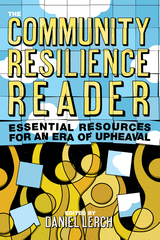
The Community Resilience Reader offers a new vision for creating resilience, through essays by leaders in such varied fields as science, policy, community building, and urban design. The Community Resilience Reader combines a fresh look at the challenges humanity faces in the 21st century, the essential tools of resilience science, and the wisdom of activists, scholars, and analysts working with community issues on the ground. It shows that resilience is a process, not a goal; how resilience requires learning to adapt but also preparing to transform; and that resilience starts and ends with the people living in a community. Despite the formidable challenges we face, The Community Resilience Reader shows that building strength and resilience at the community level is not only crucial, but possible.
From Post Carbon Institute, the producers of the award-winning The Post Carbon Reader, The Community Resilience Reader is a valuable resource for students, community leaders, and concerned citizens.
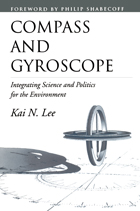
Using the Columbia River Basin in the Pacific Northwest as a case study, Kai Lee describes the concept and practice of "adaptive management," as he examines the successes and failures of past and present management experiences. Throughout the book, the author delves deeply into the theoretical framework behind the real-world experience, exploring how theories of science, politics, and cognitive psychology can be integrated into environmental management plans to increase their effectiveness.
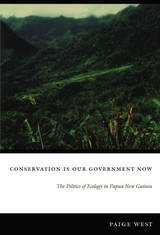
West reveals how every aspect of the Crater Mountain Wildlife Management Area—including ideas of space, place, environment, and society—was socially produced, created by changing configurations of ideas, actions, and material relations not only in Papua New Guinea but also in other locations around the world. Complicating many of the assumptions about nature, culture, and development underlying contemporary conservation efforts, Conservation Is Our Government Now demonstrates the unique capacity of ethnography to illuminate the relationship between the global and the local, between transnational processes and individual lives.
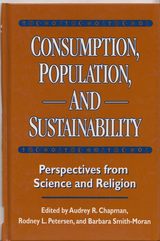
The combined contributions of science and religion to resolving environmental problems are far greater than each could offer working in isolation. Scientific findings are central to understanding the impact of human populations on the environment, but a more ecologically sustainable future will require radical changes in values, lifestyle choices, and consumption patterns -- a revolution that falls squarely within the domain of the religious community.
Consumption, Population, and Sustainability is an outgrowth of a conference sponsored jointly by the Boston Theological Institute and the American Association for the Advancement of Science that brought together more than 250 scientists and people of religious faith to discuss the environmental impact of consumption patterns and population trends, and to consider alternative and more equitable value systems, economic arrangements, and technologies that will be necessary for achieving a more sustainable future. The book:
- provides a brief history of the dialogue between science and religion on environmental issues
- outlines potential contributions of the religious community to the debate about global sustainability
- offers a science-based assessment of issues such as carrying capacity, sustainability indicators, and the environmental impacts of consumer-based lifestyles
- considers religious and theological perspectives on consumption and population from a variety of viewpoints including Roman Catholic, Jewish, Greek Orthodox, and Islamic
- examines the ethical and policy dimensions of reorienting today's consumer society to one more focused on values, spiritual growth, and relationships.
Both the scientific and religious communities can make important contributions to understanding and responding to the impact of population growth and consumption patterns on environmental sustainability. This volume represents a significant step in establishing an ongoing dialogue between the communities, and provides a thought-provoking overview of the issues for scientists, theologians, and anyone concerned with the future of global sustainability.
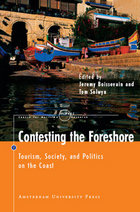
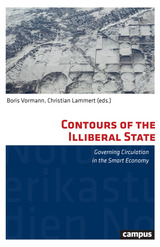
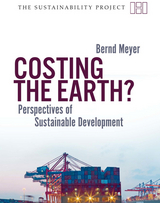
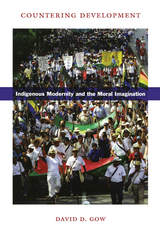
Through ethnographic fieldwork conducted annually in Cauca from 1995 through 2002, Gow compares the development plans of the three communities, looking at both the planning processes and the plans themselves. In so doing, he demonstrates that there is no single indigenous approach to development and modernity. He describes differences in how each community defined and employed the concept of culture, how they connected a concern with culture to economic and political reconstruction, and how they sought to assert their own priorities while engaging with the existing development resources at their disposal. Ultimately, Gow argues that the moral vision advanced by the indigenous movement, combined with the growing importance attached to human rights, offers a fruitful way to think about development: less as a process of integration into a rigidly defined modernity than as a critical modernity based on a radical politics of inclusive citizenship.
READERS
Browse our collection.
PUBLISHERS
See BiblioVault's publisher services.
STUDENT SERVICES
Files for college accessibility offices.
UChicago Accessibility Resources
home | accessibility | search | about | contact us
BiblioVault ® 2001 - 2024
The University of Chicago Press









